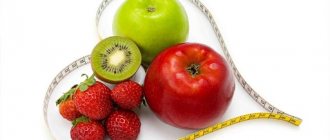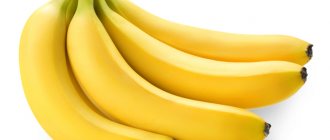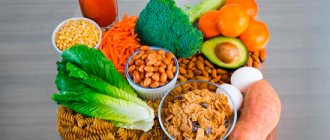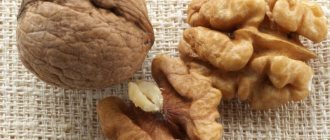Which banana is healthier, blackened or green? And should you throw away a “spotted” banana? You will find the answers in this article.
Somehow it has become so customary since the days of my hungry student youth that I often bought myself bananas with my leftover money, rather than chips or buckwheat. There can probably be many reasons for this, from “in Belarus bananas are cheaper than potatoes” to “bananas, like chocolate, promote brain activity.” But the fact remains a fact. If persimmon is a seasonal fruit, then banana is the kind of thing that accompanies us throughout life constantly. How not to repay a debt and not to write down a note. In addition, according to a mini-survey I conducted among my friends, one of the main fruits, which with a 99% probability will be on almost every New Year's table, is also a banana. But the right banana still needs to be found...
Nutritional value, composition and calorie content of bananas
One medium fruit contains about 105 calories, most of which come from carbohydrates.
100 grams of bananas contain (% of the recommended daily intake) ():
- Calorie content: 89 kcal (4%).
- Carbohydrates: 22.8 g (8%).
- Fiber: 2.6 g (10%).
- Fat: 0.3 g (1%).
- Protein: 1.1 g (2%).
- Vitamin C: 8.7 mg (15%).
- Vitamin B6: 0.4 mg (18%).
- Folic acid: 20 mcg (5%).
- Potassium: 358 mg (10%).
- Manganese: 0.3 mg (13%).
- Omega-3 fatty acids: 27 mg.
- Omega-6 fatty acids: 46 mg.
Carbohydrates
Bananas are a rich source of carbohydrates. Unripe bananas contain mainly starch, while ripe ones contain sugar. The carbohydrate composition of bananas changes dramatically during ripening.
The main component of unripe bananas is starch - green bananas contain up to 70-80% starch, in dry weight.
During ripening, starch is converted to sugars and makes up less than 1% when the banana is fully ripe. The most common types of sugar found in ripe bananas are sucrose, fructose and glucose. In ripe bananas, the total sugar content can reach more than 16% of the mass of the fresh fruit ().
Depending on the degree of ripeness, bananas have a relatively low glycemic index of 42-58 (). This is a measure of how quickly carbohydrates in food enter the bloodstream.
Bananas' low glycemic index is due to their high resistant starch and fiber content, which prevent blood sugar levels from rising quickly after eating.
Non-starchy vegetables. Full list
Nutrition experts say that non-starchy foods can be combined with any other types of food: proteins, starchy foods, fats
. Moreover, non-starchy vegetables promote their rapid breakdown and absorption, stimulate digestion, without harming the figure. Most vegetables that do not contain starch are green in color, so they are a kind of “green traffic light” for those losing weight.
Vegetables that do not contain starch are saturated with a sufficient amount of moisture, so when losing weight, a person who prefers such products feels full fairly quickly. Non-starchy vegetables also contain iron
, which promotes better digestion of meat. That is why very often restaurants serve protein dishes in combination with “light” vegetables (cabbage, lettuce, cucumbers).
https://youtu.be/x9pt-W0wP_k
Cellulose
The high proportion of starch in unripe bananas is resistant starch, which, as the name suggests, is resistant to digestion and is therefore a type of fiber.
Resistant starch travels to the large intestine, where it is fermented by bacteria in a process that produces butyrate, a short-chain fatty acid that has beneficial effects on gut health ().
Bananas are also a good source of other types of dietary fiber, such as pectin. Some types of pectin in bananas are water soluble. As bananas ripen, the proportion of water-soluble pectin increases, which is one of the main reasons why these fruits become softer as they ripen ().
Both pectin and resistant starch moderately increase blood sugar levels after meals.
Summary:
Bananas are mainly made up of carbohydrates. Unripe bananas can contain a decent amount of resistant starch, which functions as fiber to promote colon health and healthy blood sugar levels.
Vitamins and minerals
Bananas are an important source of several vitamins and minerals, especially potassium, vitamin B6 and vitamin C ().
- Potassium : Bananas are a good source of potassium. A diet high in potassium may lower blood pressure in people with high blood pressure and has a positive effect on the cardiovascular system ().
- Vitamin B6 : Bananas are high in vitamin B6. One medium banana can provide up to 33% of the recommended daily intake of vitamin B6.
- Vitamin C : Like most fruits, bananas are a good source of vitamin C.
Summary:
Bananas contain a number of vitamins and minerals in decent quantities. These include potassium, vitamin B6 and vitamin C.
Starch in pears
The question of whether there is starch in a pear is also very informative. It should be emphasized that this fruit is also a source of vitamins and macroelements. It has a whole range of useful properties, including: diuretic, antisclerotic, antibacterial, vascular strengthening, hematopoietic.
One hundred grams of pears contain 0.5 grams of starch.
Other plant compounds
Fruits and vegetables contain numerous types of bioactive plant compounds, and bananas are no exception.
- Dopamine : Is an important neurotransmitter produced in the human brain. However, it is worth understanding that the dopamine present in bananas does not cross the blood-brain barrier to influence mood, but rather acts as a powerful antioxidant ().
- Catechin : Several antioxidant flavonoids are found in bananas, especially catechins (). Catechins have been shown to provide a variety of benefits to the human body, including reducing the risk of cardiovascular disease ().
Summary:
Like other fruits, bananas contain several health-promoting antioxidants that are associated with many health benefits. These include dopamine and catechin.
The benefits of bananas for the human body
Like most natural foods, bananas have many beneficial properties. Here are the benefits of bananas:
Benefits of Bananas for Heart Health
Cardiovascular disease is the most common cause of premature death.
Bananas contain high amounts of potassium, a mineral that promotes heart health and normal blood pressure. One medium banana contains about 0.4 grams of this heart-healthy mineral.
According to a large analysis of many studies, daily intake of 1.3-1.4 g of potassium is associated with a 26% reduction in the risk of developing cardiovascular disease ().
In addition, bananas contain antioxidant flavonoids, which are also associated with a significant reduction in the risk of developing cardiovascular disease ().
Summary:
Bananas may be beneficial for heart health due to the high amount of potassium and antioxidants present in them.
Benefits of bananas for digestive health
Unripe, green bananas contain significant amounts of resistant starch and pectin, which are types of dietary fiber (fiber). Resistant starch and pectins act as prebiotic nutrients that support the growth of beneficial gut bacteria.
They pass into the colon where they are fermented by beneficial bacteria to form butyrate (), a short-chain fatty acid that promotes gut health ().
Summary:
Unripe bananas contain a decent amount of resistant starch, a type of fiber that may promote colon health.
Eating bananas helps increase energy levels
Bananas are a great snack because they provide carbohydrates in the form of instant sugars that your body can use for energy. After exercise, your body uses carbohydrates to refuel and repair muscle fibers that have been broken down.
After sports training, eating bananas supplies the body with sugar molecules that can quickly reach muscle tissue right when they are needed most. This helps quickly restore glucose stores, which is vital for your body to get the energy it needs to build muscle mass and strength.
Bananas are useful either before training (1-1.5 hours before training) or immediately after it, since their consumption provides the body with a sufficient amount of essential carbohydrates and nutrients.
Instead of relying on sugary snacks or sports drinks before or after workouts, or during your midday energy slump, try eating a banana instead. With only 89 calories per 100 grams, bananas are a great pre- or post-workout snack, especially since they are a whole food and contain no artificial ingredients compared to commercially packaged snacks.
Summary:
Thanks to the carbohydrates contained in bananas in the form of instant sugars, eating them before or after a workout, as well as during the midday slump, helps increase energy levels in the body.
Bananas can improve your mood
Bananas contain an amino acid called tryptophan, which facilitates the regulation of serotonin, one of our main “happy hormones” (). Normal levels of serotonin help improve mood and prevent mood disorders, including anxiety and depression.
Eating bananas also provides the body with antioxidants, which help with the release of dopamine in the brain, another mood-boosting hormone ().
Eating bananas regularly can help increase your energy levels, prevent fatigue and maintain a positive outlook.
Summary:
Thanks to tryptophan and dopamine in bananas, their consumption helps improve mood and prevent anxiety and depression.
Benefits of bananas for brain, skin and bones
Eating bananas can benefit your brain, skin, and bones because just one banana provides your body with 16% of the recommended daily intake (RDI) of manganese you need throughout the day.
Plus, bananas are a good source of vitamin C (more than 15% of the RDI), which helps in the production of collagen necessary for the skin.
Manganese is important for many functions in the body, including maintaining healthy skin, maintaining skeletal health, maintaining proper brain function, and reducing free radicals in the body.
Research has shown that manganese can help the brain function normally and prevent diseases such as epilepsy and Parkinson's disease (,).
Some animal studies have shown that low levels of manganese contribute to poor bone health and possibly the development of diseases such as osteoporosis.
The manganese in bananas benefits the health and appearance of your skin by promoting the production of collagen, an important structural component that keeps skin youthful and elastic.
Manganese also has anti-inflammatory and antioxidant properties, which are beneficial for naturally anti-aging as they reduce free radical damage and oxidative stress.
Summary:
Due to the significant amount of manganese and vitamin C contained in bananas, their consumption helps maintain proper brain function and improve skin and bone health. Bananas prevent diseases such as osteoporosis, epilepsy and Parkinson's disease and maintain youthful and elastic skin.
Starch in milk
Whole milk is a natural product that undergoes mandatory heat treatment before hitting store shelves. However, it is almost impossible to find a product of this quality in supermarkets. If we talk about it, then the answer to the question of whether there is starch in milk suggests itself. Naturally, there is no polysaccharide in it.
However, there is another variation of the “cow” product - the so-called “reconstituted” milk, which is made partly from dry mixture and partly from whole milk. This is what most often ends up on the shelves of our grocery stores. Unfortunately, there is little benefit from such a product, and all because when dried, milk loses 90% of its beneficial properties.
Many people know that most dairy industry enterprises use unnatural products as raw materials in winter. Moreover, the degree of fat content of milk varies from supplier to supplier. As a result, in order to reduce costs and reduce the cost of production, dairy companies often use vegetable fats. They also add soda and starch to make the “cow” product last longer. Thus, it is still possible to find starch in “artificial” milk. You can check this in a very simple way: drop a few drops of iodine into a glass of milk, and if after this the liquid acquires a bluish tint, it means that the polysaccharide has been added to the product.
Harm of bananas to the human body
So, why are bananas harmful?
There are mixed opinions about whether bananas are good for diabetics or not. It is true that bananas contain large amounts of starch and sugar, and therefore can be expected to cause a significant increase in blood sugar levels.
But because of their low glycemic index, moderate consumption of bananas should not raise your blood sugar levels as much as other high-carb foods.
However, diabetics should avoid eating large quantities of well-ripened bananas. Diabetics should always monitor their blood sugar levels after eating foods rich in sugar and carbohydrates.
On the other hand, sometimes people believe that eating bananas is a risk factor for constipation (), while other studies suggest that bananas may have the opposite effect, at least in some people ().
In conclusion, consuming bananas does not seem to have any serious side effects, at least not when consumed in moderation.
Summary:
Bananas are generally considered to be beneficial for human health. However, people with diabetes should avoid eating large quantities of well-ripened bananas.
Starch in carrots
It's no secret that carrots are a storehouse of vitamins and macroelements that help improve health. Of particular value is, of course, beta-carotene. However, is there starch in carrots? Yes, definitely. One hundred grams of orange root vegetable contains 1.4 grams of the above polysaccharide.
I would like to draw the attention of those who are interested in the question: “Is there starch in carrots?” on the carbohydrate composition of the vegetable, which is simply replete with fiber. It is precisely this that normalizes the digestive processes, improving gastric motility, and prevents food from rotting in our intestines.
Anyone particularly concerned about whether there is starch in carrots should also know that the orange root vegetable contains a lot of sucrose, so it is not suitable as an ingredient in low-calorie diets. In any case, carrots contain starch, albeit in small quantities.
Summarize
- Bananas are among the most commonly consumed fruits in the world.
- They consist mostly of carbohydrates and contain decent amounts of several vitamins, minerals and antioxidants.
- Potassium, vitamin C, manganese, catechins and resistant starch are some of the health-promoting nutrients in bananas.
- They can help improve heart, digestive, skin, brain and bone health when consumed regularly as part of a healthy lifestyle.
Tags: Bananas
- Related Posts
- Viburnum: benefits and harm to the health of women and men
- Apricot and peach: what's the difference?
- Cupuaçu: what kind of fruit is it, benefits and uses
« Previous entry











